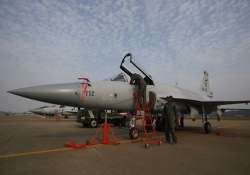China exported arms worth $11 billion in 5 years, Pakistan major buyer: Pentagon
Washington, May 7: Asserting that China has signed agreements for arms exports worth USD 11 billion from 2007 to 2011, the Pentagon has said that Pakistan remains Beijing's primary customer for conventional weapons."From 2007 to

Washington, May 7: Asserting that China has signed agreements for arms exports worth USD 11 billion from 2007 to 2011, the Pentagon has said that Pakistan remains Beijing's primary customer for conventional weapons.
"From 2007 to 2011, China signed approximately USD 11 billion in agreements for conventional weapons systems worldwide, ranging from general purpose materiel to major weapons systems," the Pentagon told the Congress in its annual report on China.
In 2012 and the coming years, China's arms exports will likely increase modestly as China's domestic defence industry improves, it said, adding that Chinese defence firms are marketing and selling arms throughout the world with the bulk of their sales to Asia and the Middle East/North Africa.
In 2012, China unveiled the Yi Long tactical unmanned aerial vehicle, which will probably be marketed to developing countries, it said.
Pakistan, it said, remains its primary customer for conventional weapons. "China engages in both arms sales and defence industrial cooperation with Islamabad, including co-production of the JF-17 fighter aircraft, F-22P frigates with helicopters, K-8 jet trainers, F-7 fighter aircraft, early warning and control aircraft, tanks, air-to-air missiles, anti-ship cruise missiles, and cooperation on main battle tank production," the Pentagon report said.
"We describe in this report China's bilateral military interactions with other countries, including Pakistan. China has a very longstanding historical relationship with Pakistan, and it's one that we watch and we report on in this report," deputy assistant secretary of defence for East Asia David Helvey told reporters during a Pentagon news conference.
Helvey said the US is monitoring very carefully China's military modernisation, the implications of that modernisation both for opportunities to cooperate with China in a multinational or bilateral context, but also for potential implications for regional stability.
According to the report, Sub-Saharan African countries view China as a provider of low-cost weapons with fewer political strings attached compared to other international arms suppliers.
"China uses arms sales as part of a multifaceted approach to promote trade, secure access to natural resources, and extend its influence in the region," it said.
"From 2007 to 2011, China signed approximately USD 11 billion in agreements for conventional weapons systems worldwide, ranging from general purpose materiel to major weapons systems," the Pentagon told the Congress in its annual report on China.
In 2012 and the coming years, China's arms exports will likely increase modestly as China's domestic defence industry improves, it said, adding that Chinese defence firms are marketing and selling arms throughout the world with the bulk of their sales to Asia and the Middle East/North Africa.
In 2012, China unveiled the Yi Long tactical unmanned aerial vehicle, which will probably be marketed to developing countries, it said.
Pakistan, it said, remains its primary customer for conventional weapons. "China engages in both arms sales and defence industrial cooperation with Islamabad, including co-production of the JF-17 fighter aircraft, F-22P frigates with helicopters, K-8 jet trainers, F-7 fighter aircraft, early warning and control aircraft, tanks, air-to-air missiles, anti-ship cruise missiles, and cooperation on main battle tank production," the Pentagon report said.
"We describe in this report China's bilateral military interactions with other countries, including Pakistan. China has a very longstanding historical relationship with Pakistan, and it's one that we watch and we report on in this report," deputy assistant secretary of defence for East Asia David Helvey told reporters during a Pentagon news conference.
Helvey said the US is monitoring very carefully China's military modernisation, the implications of that modernisation both for opportunities to cooperate with China in a multinational or bilateral context, but also for potential implications for regional stability.
According to the report, Sub-Saharan African countries view China as a provider of low-cost weapons with fewer political strings attached compared to other international arms suppliers.
"China uses arms sales as part of a multifaceted approach to promote trade, secure access to natural resources, and extend its influence in the region," it said.